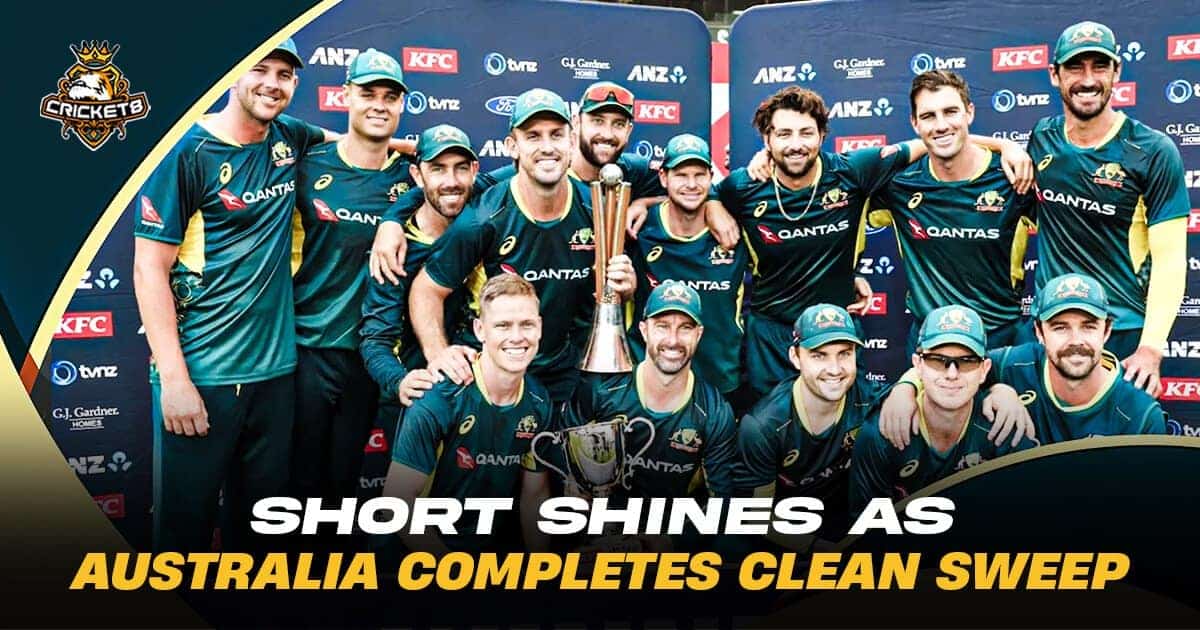Australia made it three in three games as they romped to victory in a rain-hit match against New Zealand. The visitors batted well in a game that was curtailed to 15 overs for each side. However, the revised target for the Kiwis was set at 126. They never looked to be in charge of the chase and ended up well short of the target. Matt Short staked his claim for a spot in the World Cup squad as Steve Smith failed with the bat in the shortest form of the game once again.
Team Lineups
The Australians continued their rotation by making three changes to the team. Captain Mitchell Marsh was rested for his game after his batting exploits in the previous two outings. All-rounder Matt Short came in his place. The all-rounder played in the first game, but he did not get the opportunity to bat or ball. Patrick Cummins was also given rest to accommodate Mitchell Starc.
Josh Hazlewood was another pacer who found himself in the dugout. New IPL sensation Spencer Johnson was finally ready to be unleashed upon the New Zealanders. Steve Smith was given another chance to start the innings with Travis Head. David Warner was missing due to an injury issue.
New Zealand made two changes to their team that was comprehensively beaten in the first game. Devon Conway did not come to bat after getting his finger injured in the last game. The South African born player was replaced by another wicketkeeper batsman Tim Seifert for his game. Lockie Ferguson has been in a fantastic run off late with his rapid pace and tight line. He was rested for this game with Ish Sodhi coming in to replace him. Kane Williamson and Rachin Ravindra remained missing due to injury issues.
Australia
- Travis Head 2. Steve Smith 3. Matt Short (Cap.) 4. Glenn Maxwell 5. Josh Inglis (WK) 6. Tim David 7. Mattew Wade (Cap.) (WK) 8. Mitchell Starc 9. Nathan Ellis 10. Adam Zampa 11. Spencer Johnson
New Zealand
- Finn Allen 2. Will Young 3. Tim Seifert 4. Glenn Phillps 5. Mark Chapman 6. Josh Clarkson 7. Mitchell Santner (Cap.) 8. Adam Milne 9. Ish Sodhi 10. Trent Boult 11. Ben Sears
New Zealand captain Mitchell Santner won the toss and elected to bowl first. The Eden Park venue is famous for dropping the pitch during matches. The fast bowlers are expected to exploit the movement during the early exchanges of the game. However, the spin bowlers are certain to play a key role as the game progresses.
Australia scored two runs more than the average first innings score at Eden Park. The hard back of the length deliveries can be a good weapon on this pitch for the bowlers. The carry off the surface is quite steep and wicketkeepers find it hard to judge the bounce of the pitch. The batting performance during the powerplay would determine the outcome of the match.
Fixture
This is the first series where Australia is playing T20 cricket after their T20 series win against West Indies earlier this month. On the other hand, New Zealand were triumphant against Pakistan in a 4-1 series win. The sides have met on 16 previous occasions. Out of these matches, Australia has won on ten occasions. New Zealand Indies emerged victorious in six matches.
In the ten games played on New Zealand soil, competition is intense. Australia have won six matches. New Zealand won the other four. The two sides last met in the World Cup where Travis Head inspired Australia to victory with a stunning century in a final ball thriller. Australia are 2-0 ahead in the series after win in consecutive games.
| Venue | The third and final game of the three match T20 series took place at Eden Park in Auckland. |
| Date | The game started at 12:30 p.m. IST on Sunday, February 25. |
Captaincy & Tactics
Following Australia’s resounding 3-0 clean sweep of the T20I series against New Zealand, selectors find themselves faced with a wealth of options as they shift their focus to the upcoming World Cup. Despite the rain-affected final T20I match, top-order batsman Matt Short and pace bowlers Nathan Ellis and Spencer Johnson made compelling cases for their inclusion in the World Cup squad with their brief yet impactful performances.
The series finale at a damp Eden Park not only secured Australia the coveted Chappell-Hadlee Trophy but also served as their final collective outing before the month-long World Cup commences in the Caribbean and USA in June. Notably, this series marked the first occasion since the 2022 Cup on home soil that Australia fielded a full-strength lineup, boasting the formidable trio of Pat Cummins, Mitchell Starc, and Josh Hazlewood, highlighting the depth of talent available to selectors.
While form and fitness in the upcoming Indian Premier League will undoubtedly influence the final composition of the 15-man World Cup squad, selectors are keenly aware of the importance of having versatile replacements for every specialist role. Matt Short’s dual proficiency as a dynamic batsman capable of slotting into the top six and bowling handy off-spinners enhances his appeal, especially after his notable contribution in the final T20I.
Nathan Ellis, a consistent presence in Australia’s T20 plans, and the emerging talent Spencer Johnson showcased their prowess under pressure, demonstrating commendable pace and control during their brief spells against New Zealand. Despite Johnson’s relatively recent inclusion due to injuries to Marcus Stoinis and Aaron Hardie, his performance as a backup for the seasoned left-armer Starc has strengthened his case for selection.
In a venue marked by short boundaries and a frenetic 10-over run chase, Ellis and Johnson’s ability to contain runs at a rate of barely five an over underscored their maturation and potential value to the squad. Meanwhile, Matt Short’s recognition as the player of the match for his explosive batting and effective bowling further solidified his credentials for the World Cup squad.
As the selection committee deliberates on the final squad composition, the competition for spots intensifies, with players like Ellis and Johnson proving their mettle under pressure. The depth of talent within the squad bodes well for Australia’s campaign, offering ample options to navigate through various scenarios during the World Cup.
Captain Matthew Wade lauded the collective bowling effort in defending a challenging total, emphasizing the team’s commitment to aggressive batting throughout the innings. The potency of Australia’s top seven batsmen, boasting remarkable strike rates, reflects their intent to adopt an aggressive approach similar to their successful campaigns in the 50-over and 20-over World Cups.

However, uncertainties linger regarding the final squad selection, particularly for players like Steve Smith, whose limited T20 appearances and absence from the IPL may impact his chances. Wade remains confident in his role as the preferred wicketkeeper in the starting lineup, highlighting his contributions as a lower-order batsman.
As the World Cup draws nearer, anticipation mounts, with Australia poised to unleash their formidable lineup in pursuit of glory on the global stage. The selection process promises to be rigorous, with each player vying for a coveted spot in the squad that will represent Australia’s aspirations in the T20 World Cup.
Batting Analysis
Australia completed a resounding clean sweep of New Zealand, sending an ominous warning ahead of the T20 World Cup, as they secured a comfortable victory in a truncated series-finale under the gloomy skies of Eden Park.
Amidst overcast conditions, Australia embarked on their innings, notching 67 for 2 within the powerplay phase. However, intermittent showers disrupted play, culminating in a final tally of 118 for 4 from 10.4 overs. Australia’s adept pace bowlers reveled in the seaming conditions, restricting New Zealand well below their adjusted target of 126 from 10 overs. In preparation for the upcoming Test series commencing on Thursday, both teams exercised caution, affording rest to several players.
Australia’s landmark 100th T20I victory was complemented by their acquisition of the Chappell-Hadlee Trophy, having dominated the three-match series. The series served as crucial groundwork for both squads as they strive to finalize their lineups for the impending World Cup. For Australia, this fixture marked their final tune-up before the June tournament, whereas New Zealand’s itinerary includes a five-match T20I series against Pakistan in April to conclude their preparations.
The emergence of left-arm quick Spencer Johnson proved to be a highlight, as he seized the opportunity in the absence of Pat Cummins and Josh Hazlewood. With fiery deliveries exceeding 140 km/h, Johnson’s relentless pace dismantled New Zealand’s top order, leaving them grappling against Australia’s formidable bowling attack.
Despite New Zealand’s depleted batting lineup, which notably missed opener Devon Conway due to injury, they struggled to find footing in the chase. Fielding on a lively surface posed challenges, compounded by Australia’s disciplined bowling and astute field placements.
While Steven Smith’s role in Australia’s starting XI remains uncertain, Matthew Short showcased his prowess with a blistering cameo at No. 3. Short’s aggressive batting, reminiscent of his dominance in the BBL, provided Australia with crucial momentum before succumbing to a deceptive slower delivery.
New Zealand’s lapses in fielding further exacerbated their plight, with three dropped catches marring Australia’s innings. The missed opportunities reflected a series marred by subpar fielding from New Zealand, echoing their earlier struggles in the opening fixtures.
As the T20 World Cup draws near, both teams will seek to address their shortcomings and refine their strategies, mindful of the formidable competition that lies ahead.
Bowling Analysis
Australia’s fringe short-format players showcased their mettle and strengthened their T20 World Cup prospects by orchestrating a comprehensive 3-0 sweep of the Chappell-Hadlee Trophy series against New Zealand at Eden Park, a venue fraught with rain-induced interruptions.
In the truncated final T20I, Spencer Johnson (1-10) and Nathan Ellis (0-11) delivered stellar performances, constraining the Kiwi batsmen to fall 27 runs short of their revised 126-run target under the DLS method. The inclement Auckland weather curtailed Australia’s innings at 4-118 from 10.4 overs, but not before Matthew Short’s blitzkrieg innings of 27 runs off a mere 11 balls, punctuated by three towering sixes.

New Zealand’s fielding woes plagued them early on as they grassed three catches within the initial half-hour, affording Travis Head the opportunity to capitalize and top-score with a resilient 33 from 30 deliveries. Johnson, a late inclusion in the series, unleashed his fiery pace, leaving the Black Caps grappling with the steep bounce generated by the left-arm quick.
Despite their remarkable performances, Johnson, Ellis, and Short find themselves on the cusp of cementing permanent berths in the T20I setup. Their aspirations now hinge on securing spots in the squad bound for the T20 World Cup in the USA and the Caribbean.
As the T20 extravaganza progresses, Ellis and Johnson will seek to amplify their impact in the forthcoming Indian Premier League, buoyed by Australia’s final T20I outing before the impending ICC event in June.
New Zealand’s captain, Mitchell Santner, wary of the looming forecast, opted to field first, setting the stage for a stern examination of Australia’s revamped batting lineup. However, Steve Smith’s experimentation as an opener faltered once again, as he succumbed to Adam Milne’s delivery, departing early in the innings.
The Kiwis’ missed opportunities compounded their woes, with Head benefitting from two let-offs, courtesy of Josh Clarkson and Ish Sodhi, before eventually falling victim to Santner’s astute tactics.
Australia’s top order, cognizant of the likelihood of a curtailed innings, embarked on an aggressive onslaught from the outset. Maxwell, Short, and Tim David wasted no time in dispatching the ball into the stands, setting a blistering tempo despite the looming rain delays.
Amidst the uncertainties of weather and formidable opposition, Australia’s resolute display underscored their depth and resilience in the T20 arena, leaving selectors with intriguing deliberations as they shape the squad for the marquee event on the global stage.
Fielding Analysis
The New Zealand fielding performance was nothing short of shambolic in this game. The fielding mistakes started when Josh Clarkson dropped Travis Head on the final delivery of the fourth over. The ball came straight to Clarkson who was fielding at backward point, but he failed to grab this easy opportunity. Head’s good fortune did not end there. He got another reprieve an over later when Ish Sodhi dropped another chance while standing at short fine-leg. This catch was much easier than the first one but Ish Sodhi just could not hold on. The Kiwis dropped the third chance of the innings when Mark Chapman dropped Glenn Maxwell at long-off. Chapman got both hands to the ball but could not hold on to the opportunity.
Finally Ish Sodhi caught Travis Head at short third man to end his lucky ride. Will Young’s catch dismissed Glenn Maxwell from a Ben Sears delivery. Tim Seifert finely caught Matthew Short and he also caught Steve Smith out.
Mitchell Starc completed a decent sliding catch to dismiss Finn Allen. Josh Inglis caught Tim Seifert out. Will Young was dismissed by Matt Short as Adam Zampa completed a safe grab. The Australian fielding performances have been top notch throughout the series. They look fit and ready for the World Cup.
Key Performances
Travis Head continued his hot streak with the bat with another 30+ score at the top of the order. The South Australian was somewhat more cautious than his usual approach in this game. He scored 33 from 33 deliveries with the help of 5 fours and 1 six. Steve Smith might have spurned his opportunity to secure a place in the opening slot by failing once again.
Matthew Short was playing for the second time in this series. The all-rounder did not get the chance to bowl or bat in the first match. He scored 27 from 11 deliveries in this match. The Victorian’s innings featured 1 four and 3 sixes to boost the run-rate. T20 superstar Glenn Maxwell played an important cameo of 20 runs from 9 deliveries to keep the run-rate high. Josh Inglis and Tim David also provided meaningful knocks.

Josh Clarkson was the pick of Kiwi bowlers with one wicket for 8 runs. The 27 year all-rounder claimed the important wicket of Glenn Maxwell with his medium pace bowling. Kiwi captain Mitchell Santner maintained a tight line. He refused to let Travis Head off the hook while bowling regularly at the stumps. The left-arm orthodox bowler eventually dismissed Travis Head when he tried to break the shackles. Adam Milne and Ben Sears also claimed one wicket apiece albeit they were expensive. Trent Boult had an off day as he conceded 24 from his 2 over spell.
Just like the last game, Glenn Phillps was the lone warrior for New Zealand with the bat. The Kiwi all-rounder hit 5 fours and 2 sixes in his innings of 40 from 24 deliveries. Mark Chapman ended the day with an unbeaten 17 runs from 15 deliveries. However, the Kiwi top order struggled from the start to keep up with the mounting run rate. Finn Allen managed to get 13 from nine deliveries. Will Young looked good but got out after scoring 14 from 7 deliveries. Tim Seifert could not make the most of his opportunity by scoring only 2 from five deliveries.
Spencer Johnson displayed why he is rated so highly in this format. The 28 year old South Australian bowled at a rapid pace and created constant menace for the batsmen. Johnson picked up one wicket by giving away only 10 runs from 2 overs. Adam Zampa also claimed one wicket in his two over spell. Man of the match Matt Short was expensive in his two over spell. The all-rounder cost 33 runs and picked up the important wicket of Will Young. Nathan Ellis showed his variety of deliveries and gave away just 11 runs from his 2 overs.
Match Result
In this rain-hit game, Australia secured their win by a margin of 27 runs. The DLS target was 126 and the Kiwis fell well short of it. Australia has completed a whitewash of their Trans-Tasmanian neighbours in the T20 series.
Series Result
Australia won the series 3-0 with Kiwis falling short in all departments. The Aussies retain the Chappell-Hadlee trophy with a clean sweep of their neighbours.
Player of the Match
For his invaluable innings of 27 from 11 deliveries and one wicket with the ball, Matthew Short won the player of the match award. The 28 year old all-rounder appeared for the first time as Australia tried different team combinations throughout the series.

Player of the Series
For his wonderful all-round performance, Australian captain Mitchell Marsh won the player of the series award. The towering cricketer played a match winning knock of 72 in the first match. He followed that up with 24 in the second game. He got one wicket each in the first two games.
Brief Scorecard
| Australia Total: 118/5 (10.4 from a maximum of 15 overs) | New Zealand Total: 98/3 (10 from maximum of 10 overs)Revised Target: 126 |
| Travis Head 33 (30) | Glenn Phillips 40* (24) |
| Matt Short 27 (11) | Mark Chapman 17* (15) |
| Josh Clarkson 1-8 (1 overs) | Spencer Johnson 1/10 (2 overs) |
| Mitchell Santner 1/16 (2 overs) | Adam Zampa 1/20 (2 overs) |
Match Highlights
Match Wrap-Up
It was another easy victory for the Australians in the end. They posted a good total on a tough condition and bowled fantastically to restrict the New Zealanders. Matt Short and Travis Head played valuable innings with the bat. Spencer Johnson shone with the ball to declare his arrival on the scene. The New Zealanders have played good cricket in spells but they came short when it mattered. After the clean sweep, the two teams will meet for the Test series due to start on Thursday. The two match series will kick off at Basin Reserve.




